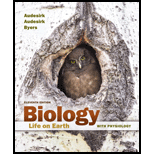
Concept explainers
Evolution is
- a. a belief.
- b. a scientific theory.
- c. a hypothesis.
- d. never observed In the modern world.
Introduction:
Evolution is defined as the change in heritable characteristics in a biological population over a successive generation. Evolution is a result of mutation, natural selection, genetic drift and sexual selection.
Answer to Problem 1MC
Correct answer:
Evolution is based on scientific theory. Therefore, option (b). is correct.
Option (b). is given as “a scientific theory”.
Explanation of Solution
Justify reasons for the correct statement:
Evolution involves genetic changes in a population with time. Evolution is a result of natural selection that causes variation among individual in a population. Evolution is a scientific theory which was formulated by Charles Darwin and Alfred Russel Wallace.
The scientific theory of evolution was supported by a study of fossils, geological studies, radioactive dating of rocks, the study of genetics, molecular biology, biochemistry and certain breeding experiments. It involves a vast diversity of life as well as similarities among different types of organisms.
Hence, option (b). is correct.
Justify reasons for the incorrect statements:
Option (a). is given as “a belief”.
Evolution is based on scientific studies by several scientists. Hence, it is a wrong answer.
Option (c). is given as “a hypothesis”.
Evolution is based on scientific theories which state that living organisms are evolved from preexisting organisms and distinguishable differences occur due to modification in a successive generation. Hence, it is a wrong answer.
Option (d). is given as “never observed in the modern world”. Evolution is a result of mutation, sexual selection, genetic drift and natural selection that are observed in the modern world. Hence, it is a wrong answer.
Hence, options (a), (c) and (d) are incorrect.
Evolution was supported by scientific theories which involve the genetic, biochemical, study of fossils.
Want to see more full solutions like this?
Chapter 1 Solutions
Biology: Life on Earth with Physiology (11th Edition)
- Selection of Traits What adaptations do scavengers have for locating and feeding on prey? What adaptations do predators have for capturing and consuming prey?arrow_forwardCompetition Between Species What natural processes limit populations from growing too large? What are some resources organisms can compete over in their natural habitat?arrow_forwardSpecies Interactions Explain how predators, prey and scavengers interact. Explain whether predators and scavengers are necessary or beneficial for an ecosystem.arrow_forward
- magine that you are conducting research on fruit type and seed dispersal. You submitted a paper to a peer-reviewed journal that addresses the factors that impact fruit type and seed dispersal mechanisms in plants of Central America. The editor of the journal communicates that your paper may be published if you make ‘minor revisions’ to the document. Describe two characteristics that you would expect in seeds that are dispersed by the wind. Contrast this with what you would expect for seeds that are gathered, buried or eaten by animals, and explain why they are different. (Editor’s note: Providing this information in your discussion will help readers to consider the significance of the research).arrow_forwardWhat is the difference between Uniporters, Symporters and Antiporters? Which of these are examples of active transport?arrow_forwardWhat are coupled transporters?arrow_forward
- How do histamine and prostaglandins help in the mobilization of leukocytes to an injury site? What are chemotactic factors? How do they affect inflammation process?arrow_forwardCompare and contrast neutrophils and macrophages. Describe two ways they are different and two ways they are similar.arrow_forwardDescribe the effects of three cytokines (not involved in the initial inflammation response). What cells release them?arrow_forward
 Concepts of BiologyBiologyISBN:9781938168116Author:Samantha Fowler, Rebecca Roush, James WisePublisher:OpenStax College
Concepts of BiologyBiologyISBN:9781938168116Author:Samantha Fowler, Rebecca Roush, James WisePublisher:OpenStax College Human Biology (MindTap Course List)BiologyISBN:9781305112100Author:Cecie Starr, Beverly McMillanPublisher:Cengage Learning
Human Biology (MindTap Course List)BiologyISBN:9781305112100Author:Cecie Starr, Beverly McMillanPublisher:Cengage Learning Biology Today and Tomorrow without Physiology (Mi...BiologyISBN:9781305117396Author:Cecie Starr, Christine Evers, Lisa StarrPublisher:Cengage Learning
Biology Today and Tomorrow without Physiology (Mi...BiologyISBN:9781305117396Author:Cecie Starr, Christine Evers, Lisa StarrPublisher:Cengage Learning


